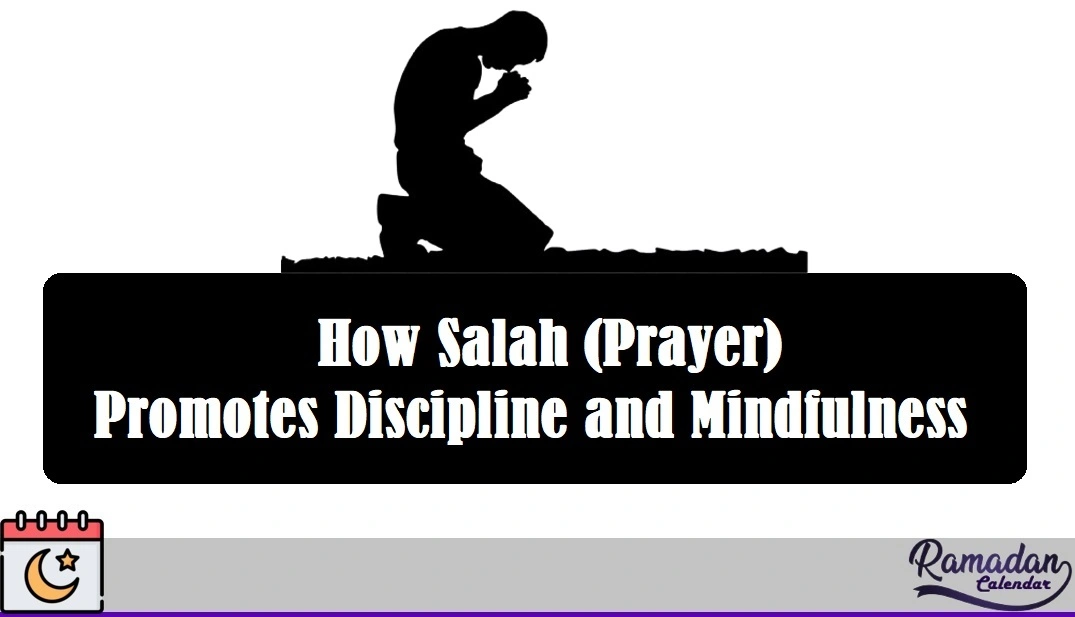How Salah (Prayer) Promotes Discipline and Mindfulness in Daily Life
How Prayer Promotes Discipline and Mindfulness in Daily Life

How Salah (Prayer) Promotes Discipline and Mindfulness in Daily Life: Salah (prayer) is one of the most fundamental acts of worship in Islam, observed five times a day by Muslims around the world. More than just a ritual, Salah serves as a profound tool for personal growth, promoting discipline and mindfulness in ways that can transform daily life. By understanding the deeper purpose and benefits of Salah, one can appreciate how this act of devotion nurtures both spiritual and worldly success.
Discipline: A Structured Framework for Life
Discipline is the foundation of a successful and purposeful life, and Salah provides a structured framework to cultivate it. Observing Salah requires adhering to specific timings, movements, and recitations, all of which demand consistency and commitment. This routine instills a sense of responsibility and accountability that transcends the act of prayer itself.
Regularity and Time Management
The five daily prayers—Fajr, Dhuhr, Asr, Maghrib, and Isha—are distributed across the day, creating a natural rhythm that encourages effective time management. Each prayer has a specific window, teaching Muslims to prioritize and allocate their time wisely. For instance, waking up for Fajr before sunrise fosters an early start to the day, a habit often associated with increased productivity and focus.
The Prophet Muhammad (peace be upon him) emphasized the importance of punctuality in prayer, saying:
“The best deeds are those performed regularly, even if they are few.” (Sahih Bukhari)
This regularity extends to other aspects of life, helping individuals become more organized, reliable, and goal-oriented.
Discipline Through Physical and Spiritual Preparation
Before performing Salah, one must observe wudu (ablution), ensuring physical cleanliness and readiness to stand before Allah. This act of preparation reinforces the importance of discipline in maintaining hygiene and self-awareness. Additionally, the precise movements and recitations of Salah require focus and adherence to guidelines, further cultivating a disciplined mindset.
Mindfulness: A Path to Inner Peace
In an age dominated by distractions and stress, mindfulness has become a sought-after skill. Salah, when performed with sincerity and concentration, is a powerful practice for achieving mindfulness. By dedicating moments of the day to connect with Allah, Muslims can find solace and clarity amid life’s chaos.
Presence in the Moment
Salah encourages the worshipper to be fully present, both physically and mentally. Each movement—standing, bowing, prostrating, and sitting—is accompanied by specific supplications and verses from the Quran. To recite these with understanding and intention requires full attention, drawing the mind away from worldly concerns.
The Quran highlights this connection between prayer and mindfulness:
“Indeed, the prayer prevents immorality and wrongdoing, and the remembrance of Allah is greater.” (Surah Al-Ankabut, 29:45)
Through this conscious engagement, Salah becomes a sanctuary where individuals can reflect, recalibrate, and renew their sense of purpose.
Gratitude and Reflection
Salah is inherently an act of gratitude. Each prayer includes praises of Allah, expressions of humility, and acknowledgments of His blessings. By regularly pausing to express thankfulness, Muslims develop a positive outlook and a greater appreciation for life’s gifts. This practice fosters emotional resilience and contentment, reducing feelings of anxiety and dissatisfaction.
Prostration: A Symbol of Submission and Connection
The act of prostration (sujood) is particularly powerful in fostering mindfulness. In this position, the worshipper places their forehead on the ground, symbolizing complete submission to Allah. This physical act is deeply humbling and grounding, reminding individuals of their reliance on the Creator and the transient nature of worldly matters.
The Prophet Muhammad (peace be upon him) said:
“The closest a servant is to his Lord is when he is in prostration.” (Sahih Muslim)
Transforming Daily Life Through Salah
The discipline and mindfulness cultivated through Salah extend far beyond the prayer mat, influencing every aspect of daily life. Here’s how:
- Improved Focus and Productivity: The ability to concentrate during Salah enhances overall focus, helping individuals tackle tasks with greater efficiency and precision.
- Emotional Regulation: Regular prayer provides a safe space to release stress and seek comfort, leading to improved emotional well-being.
- Stronger Relationships: The values of patience, gratitude, and humility nurtured through Salah positively impact interactions with family, friends, and colleagues.
- Enhanced Decision-Making: By pausing for prayer throughout the day, Muslims have the opportunity to reflect on their actions and decisions, fostering a more thoughtful and intentional approach to life.
Practical Tips for Enhancing Discipline and Mindfulness in Salah
To fully benefit from Salah, it is essential to approach it with sincerity and focus. Here are some practical tips:
- Set a Routine: Establish a consistent schedule for prayer, ensuring that you prioritize it over other activities.Understand the Meaning: Learn the meanings of the verses and supplications recited during Salah to deepen your connection and concentration.
- Eliminate Distractions: Create a clean and quiet space for prayer, free from interruptions.
- Perform Wudu Mindfully: View ablution as a spiritual preparation, focusing on the purification process.
- Seek Knowledge: Continuously educate yourself about the spiritual and practical benefits of Salah to maintain motivation and commitment.
Conclusion
Salah is far more than a ritualistic act; it is a transformative practice that promotes discipline and mindfulness, enriching both spiritual and worldly aspects of life. By adhering to the structured framework of prayer and engaging in it with sincerity, Muslims can cultivate a sense of purpose, inner peace, and resilience. In the words of the Quran:
“Successful indeed are the believers, those who humble themselves in their prayers.” (Surah Al-Mu’minun, 23:1-2)
Embracing Salah as a means of personal growth allows individuals to navigate life’s challenges with grace and gratitude, ultimately leading to a more fulfilling and meaningful existence.





